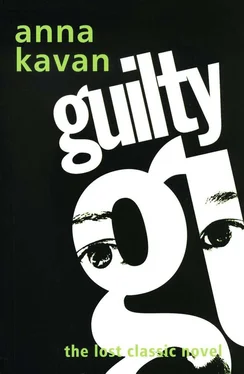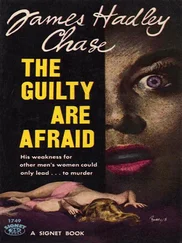Anna Kavan - Guilty
Здесь есть возможность читать онлайн «Anna Kavan - Guilty» весь текст электронной книги совершенно бесплатно (целиком полную версию без сокращений). В некоторых случаях можно слушать аудио, скачать через торрент в формате fb2 и присутствует краткое содержание. Год выпуска: 2007, Издательство: Peter Owen Publishers, Жанр: Современная проза, на английском языке. Описание произведения, (предисловие) а так же отзывы посетителей доступны на портале библиотеки ЛибКат.
- Название:Guilty
- Автор:
- Издательство:Peter Owen Publishers
- Жанр:
- Год:2007
- ISBN:нет данных
- Рейтинг книги:3 / 5. Голосов: 1
-
Избранное:Добавить в избранное
- Отзывы:
-
Ваша оценка:
- 60
- 1
- 2
- 3
- 4
- 5
Guilty: краткое содержание, описание и аннотация
Предлагаем к чтению аннотацию, описание, краткое содержание или предисловие (зависит от того, что написал сам автор книги «Guilty»). Если вы не нашли необходимую информацию о книге — напишите в комментариях, мы постараемся отыскать её.
Guilty — читать онлайн бесплатно полную книгу (весь текст) целиком
Ниже представлен текст книги, разбитый по страницам. Система сохранения места последней прочитанной страницы, позволяет с удобством читать онлайн бесплатно книгу «Guilty», без необходимости каждый раз заново искать на чём Вы остановились. Поставьте закладку, и сможете в любой момент перейти на страницу, на которой закончили чтение.
Интервал:
Закладка:
He gave me now a slightly inquiring glance, wondering, doubtless, why I didn’t get out of the way. I was evidently more strung up than I realized, swept by a sudden emotion I couldn’t control. Before I could stop myself, I’d blurted out the first words to come into my head: ‘I don’t want to live in your flat any more.’ I remember they rather surprised me. I must actually have stamped my foot in impotent infantile rage, for I have an impression of the lifeless jarring hardness of the paving stones. Thus ludicrously expressed, my sudden anger as suddenly ended, leaving me thoroughly dismayed by my own behaviour, foolishly confronting Spector’s cool and astonished gaze.
‘You need not. I told you at the start you were to live as and where you chose. I merely tried to help you, not to interfere in your affairs.’
His cold voice horrified me. Stammering and incoherent,
I began to apologize, leaning into the car, showing my face, in which he could have read all I was unable to put into words: my penitence, my submission, my utter dependence on his goodwill. But he didn’t look at me, and his own face remained so cold and stern that I was quite demoralized and would have gone on indefinite with my apologies if he hadn’t cut them short.
‘The flat’s there — take it or leave it. No one else can live in it, anyhow.’ Still without turning his head in my direction he said good-night in the same chilly tone. My last glimpse was of his unchanging profile, which might have been hewn out of rock, as my lips shaped an automatic good-night, and I let my arms fall hopelessly at my sides.
I was not very far from tears just then. Whether by association or some other means, he always had the power to reduce me to the emotional status of childhood. And what I felt were a child’s sensations: the helplessness, loneliness, inarticulateness; the fear of being forgotten, of not being loved, of being misunderstood — the fear that nobody ever would care or would understand.
The great car shot forward abruptly, driving a sudden tremendous blast of air against me, so that I staggered back, the lights swimming dizzily in front of my eyes. And when my vision steadied again, the street was quite empty.
The next day I was deeply depressed, not only on account of this disastrous end to the evening but because I’d told Link so definitely I would leave the flat, and during the night I’d decided, for some obscure reason, that my only hope of reinstating myself with Spector was to stay on there.
Out of a muddled sense of obligation I was always first in the office, as if to start work before the others was the least I could do, since I enjoyed the inestimable privilege of living in the building. On this particular morning, Link happened to come in next, and at the sight of him my loneliness and misery overflowed in a sudden longing for human contact; without stopping to think how odd my confidences would sound to someone I scarcely knew, I impulsively started to tell him, while we had the room to ourselves, why I couldn’t give up the flat, though I’d really meant to do so yesterday. He listened patiently while I tried to explain the vital part Spector’s goodwill played in my life and how I was afraid of losing it if I left the home with which he’d provided me. It was all simple and self-evident in my mind; but I knew, without looking at my hearer’s bewildered face, that I wasn’t succeeding in making it clear. Indeed, it seemed quite impossible to convey the peculiar significance of my relations with Spector, of which I’d never spoken to anybody before and which I began to suspect nobody but myself would ever be able to understand. I was relieved when the others came in, interrupting my involved, unintelligible speech.
‘I told you he might not like you to leave’ was Link’s only comment, made with no hint of disapproval or of reproach, while the rest of the staff settled down to the day’s work. I looked at him gratefully, pleasantly surprised by his tolerance, and he acknowledged my glance with an understanding smile, which suddenly warmed me, so that some of my depression evaporated and I felt better. My long-winded explanation had achieved something valuable, after all: for the first time since leaving school I seemed to have made a contact with someone.
Later, when Link again proposed lunching together, I gladly accepted, my pleasure only dimmed by the fear of having to give, in greater detail, my reasons for not leaving the flat — I myself hadn’t looked into them very closely, instinctively aware that they wouldn’t stand careful examination. However, he tactfully kept off the subject — nor did he ever, as far as I can recall, introduce it again. I was more than grateful to him for keeping silent, as by doing so he seemed tacitly to agree with me, exonerating me from blame.
Everyone, I suppose, knows those periods when everything in life seems to conform to a pattern, as though every event and meeting were preordained and carefully timed by a thoughtful providence. Such a period began for me after my unfortunate evening with Spector, from whom I heard nothing more, so that after a while I was forced to conclude I must have alienated him to the point of losing interest in me altogether. For almost my whole life I’d considered the loss of his friendship (if that’s the right word) the greatest catastrophe imaginable. Yet now, when the disaster had actually taken place, I suffered far less than I’d expected, events in the outer world all conspiring to soften the blow.
First and foremost, my association with Link provided what was most essential for my distraction: a perfectly normal companion of my own age and one whose special qualities, derived from solid good sense rather than brilliance, were especially useful to me at this time.
A better person couldn’t have been found to take me out of myself. And his stability saved me from extremes of emotion, keeping things in perspective and providing me with a sort of ballast out of the steadiness of his own character. Though rather reserved, he was by no means unsociable, and I soon found myself sharing many of his activities. He took me to his home, where his sisters supplied the lightness and gaiety I might have missed in him — the quiet one, as they called him.
I became a frequent visitor there, fascinated by this introduction to the happy family background I’d never known but for which I’d always felt an unconscious longing. It was so different from anything in my experience that my previous life began to seem like another existence; its happenings grew dim and unimportant, just as the world of imagination faded out like the memory of a dream in the sun, now that I no longer felt in need of an escape from reality.
Either following Link’s example or from their own gregarious instincts, the rest of the office staff, seeing me a fixture there, became less hostile. I never made friends with any of them as I did with him, but by slow degrees I found myself absorbed into the collective life of the place; little by little, they came to accept me, though always with reservations.
Gaining self-confidence as my life grew fuller and my circle of acquaintances widened, I thrust the memory of Spector away from me and for long periods scarcely thought about him at all. But, ultimately, a dim regret always recurred. Periodically I would feel sorry that I’d failed to win his affection and that I’d offended him at our last meeting. To forget him entirely was impossible, if only because he sometimes came to the office — though at very long intervals — taking no more notice of me on these occasions than of any other employee.
To see him invariably caused me a faint stirring of uneasiness; a feeling more like guilt than anything, if it has to be classified. I would ask myself then why I’d never made any attempt to bridge the gulf of estrangement that had opened between us — perhaps if I had he would have met me halfway. Considering my indebtedness to him, it seemed no more than my duty to make the effort. But I did nothing, unable to overcome my unwillingness to approach him. Recalling my childish declaration of loyalty that was to have been eternal, I knew that I was really afraid of coming again under his influence. I dreaded a return to my slavish subservience to his will. Yet the idea of going back to him never quite left me; the possibility of a return was always at the back of my mind, though only as a kind of dream-alternative to whatever I happened to be doing, an unspecified ‘somewhere else’, never given a name. Though I felt, on the whole, much happier now that I really seemed to be living the same life as other people, I sometimes had obscure guilt feelings, as if this were not my true destiny and in being dis-loyal to Spector I had also betrayed myself. But, since it was only his actual presence that brought these ideas to the surface, I could afford to ignore them. Most of the time I was proud of my emancipation; my life seemed satisfactorily full and normal. I was mainly content.
Читать дальшеИнтервал:
Закладка:
Похожие книги на «Guilty»
Представляем Вашему вниманию похожие книги на «Guilty» списком для выбора. Мы отобрали схожую по названию и смыслу литературу в надежде предоставить читателям больше вариантов отыскать новые, интересные, ещё непрочитанные произведения.
Обсуждение, отзывы о книге «Guilty» и просто собственные мнения читателей. Оставьте ваши комментарии, напишите, что Вы думаете о произведении, его смысле или главных героях. Укажите что конкретно понравилось, а что нет, и почему Вы так считаете.












